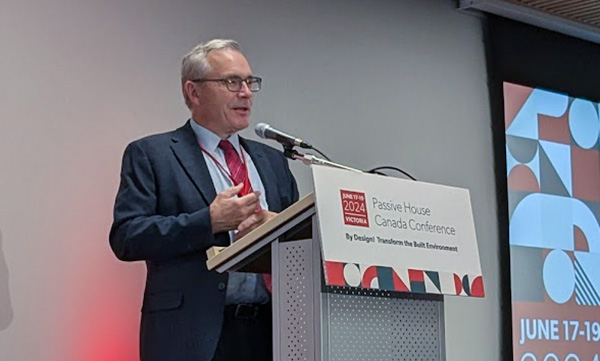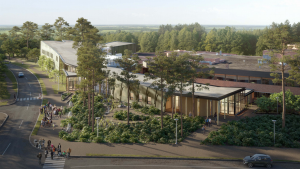“Nothing happens until it all happens at once. And I’m waiting for it to all happen at once. I know we’re on the cusp of it.”
This high level of enthusiasm was expressed by Passive House Canada (PHC) CEO Chris Ballard during his opening address at last week’s 6th Annual Passive House Canada Conference at the University of Victoria.
In addition to returning to its West Coast roots, PHC held its meetings in Passivhaus-certified buildings for the first time, an important landmark for the organization.
Ballard also pointed out that over his four years as CEO, membership has grown five-fold to over 2,000. Newsletter subscriptions have increased to 14,000. PassivHaus-certified or “passive adjacent” buildings now number 10,000 across the country.
However, Ballard expects more from Passive House Canada. His confidence stems from what he observes as the changing attitudes of key players who now recognize Passive House Canada as an important force in the drive towards improved energy-efficiency and occupancy comfort.
Ballard said policy-makers, financiers and business people want to know how to build on mass to the Passivhaus standard, how to create the appropriate building legislation that promotes the building of Passivehaus, or passive adjacent, and how to finance these buildings.
“The conversation has shifted from, ‘What is Passive House?’ to ‘How do we do more of it? How do we do it faster? And how do we do it cost-effectively?’” he said.
Ahead of the three days of learning sessions and panel discussions, the 500 in-person and virtual attendees were treated to a keynote address from Bill Reed, a founding board member of the U.S. Green Building Council and a principal of Regenesis. The organization’s work centres on the creation and management of integrative whole and living system design processes known as “Regenerative Development.”
Reed challenged his audience to think beyond designs that seek to achieve improved building efficiencies. That’s only one piece in the overall environmental puzzle, he said.
“There’s more to be done. How do we use the architecture of buildings as acupuncture points to begin to heal the world, not just limit the damage? We live in an interconnected, dynamic, complex and evolving system. We cannot save the Earth by solving fragmented problems.”
Such big picture thinking was a point of departure for attendees.
“It was really refreshing,” Chris Hill, principal with Vancouver modular home builder bCollective, told the Daily Commercial News. “It was really good, different. I was surprised, quite frankly.”
Hill said Reed’s address and the panel session Reed hosted later that day were the main topics of conversation among attendees at dinner that evening.
In addition to Reed’s thought-provoking outlook, other new topics were brought forward.
For example, presentations addressed the growing importance of embodied carbon and its convergence with Passivhaus standards.
Discussions concerning increased potential for Passivehaus-certified structures among private sector investors also expanded the conference’s overall perspective.
Brett Sagert, ESG and sustainability specialist for Vancouver property developer and builder Townline Housing Solutions, told the Daily Commercial News the presentation by Joseph Ogilvie of Archangel Ventures opened his eyes to new ideas. Ogilvie outlined innovative sources for capital investment, and the ROI potential for converting underutilized Class B and C office buildings into affordable housing.
“I’ve come away from the conference with a new light on how to bring up this conversation with some of our development team and our company president,” he said.
Many of the other 30 educational sessions concerned the latest thoughts on Passive House design and construction matters. Topics included high-level presentations on climate and catastrophic resiliency, building envelopes, low-energy mechanical systems, the integration of mass timber construction into Passivehaus designs and overall quality of life issues related to efficient building design.
The conference closed with an award ceremony recognizing component manufacturers and individual projects that had recently achieved Passivhaus certification. This was punctuated by the 2024 Harold Orr Award, which was presented jointly to the University of Victoria and Mike Wilson, its director of campus planning and sustainability.




Recent Comments
comments for this post are closed